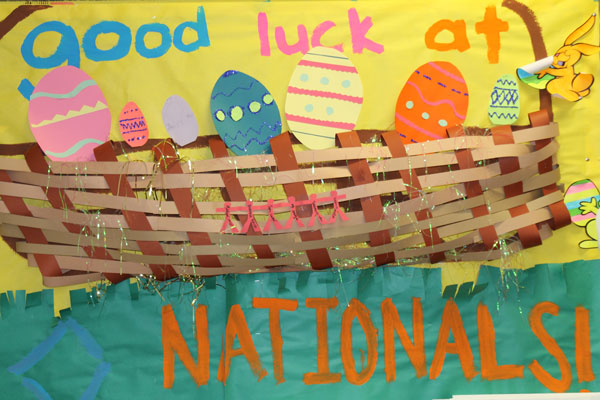
Every year DECA juniors and seniors spend a good chunk of their time developing and perfecting a project that will take them to nationals. On May 2, a handful of DECA members will depart to Atlanta, Georgia to present their projects for the last time.
“It feels really good to be qualified for nationals because it’s a combination of all of the hard work you have put into the year and all of the deadlines we had to meet. It’s nice knowing it was all worth it because you beat people who worked just as hard as you,” senior Jack Glover said.
In order to qualify for nationals, students must place at the state competition. State was held in Lincoln, Nebraska this year.
“First we had to take a 100 question multiple choice test a week before state. Then when we got there we were given a role play which is where we are given a business situation. We had to come up with our ideas in 30 minutes and then we presented our ideas to judges and they scored us,” junior Steph Purcell said, “After that they narrowed it down to the top 8 teams (ours had 34 teams). Since we made top 8 we had to do another role play and then go to awards.”
Before students even got to participate at state, they had to write a 30 page paper and do a ten minute speech on their project. Multiple deadlines and critiquing projects could be stressful at times.
“To make it to nationals there was a lot of repetition, going over our scripts so we could make it sound like we weren’t nervous. That on top of the project itself,” junior Spencer Belcastro said.
When the DECA members arrive in Georgia, they will get the opportunity to experience the city and have some fun.
“It’s a reward for all of the hard work you put in. When we go there we do have to go to some meetings and opening ceremonies and stuff, but we are also going to six flags, we get to go to a baseball game, a concert and an aquarium. There’s so much stuff we get to do where we get to see the city and enjoy it,” Glover said.
Gogi Supenski, DECA sponsor and one of the supervisors of the trip, is also excited for students to experience nationals.
“The seniors that have qualified to go are all really excited to go, and I think they will represent Bellevue West and the state of Nebraska very well,” Supenski said.
Nationals isn’t only vacationing and running around the city, however. Students really have to focus if they want to do well in their category.
“My advice is to really take this seriously, don’t procrastinate. The fine details really count, when you get to the international conference it is those small details such as having your speech memorized that can make all of the difference,” Supenski said.
The trip overall costs $1,100 per student, but with all of the revenue the DECA cards and cookie store sales brought in, each student is getting $300 in scholarships. To raise money for the trip, some students sold raffle tickets around Bellevue. Cost, however is not necessarily what kept a couple students from going.
“We had a few students who decided not to go to nationals. It wasn’t just cost, I think that does play a part in it, but there are some activities that students didn’t want to miss. So some of them made the decision to not go because of other conflicting activities,” Suspenski said.
Students seem to have the right idea when getting prepared to represent Bellevue West at the national competition. Many are excited to meet people from all over the world and bond with their classmates.
“DECA nationals is a great opportunity for meeting new people, networking, and just putting everything we have learned into real life,” junior Ryan Plambeck said.
For seniors especially, this competition is a great way to end their DECA experience before they graduate high school.
“Nationals means a lot to me because it’s a great opportunity to prove myself. I’m glad I get to share that with everyone in my class because I saw how hard they worked to qualify,” senior Ellis Wiltsey said.
Placing at state and making it to nationals is an accomplishment in and of itself. No matter how students place this week, their hard work won’t go unnoticed.
“Even if students don’t make it to top ten or top three, they made it to nationals and they get to see what hard work actually does and that it pays off,” Supenski said.
Chloe Brim
Features Editor




















